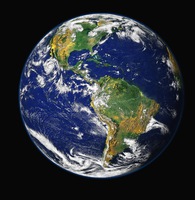- Home
- diet and the environment
Blog Categories
Recent Posts
Ozone for Dinner: How what we eat impacts our planet
Posted by on
September 16th was World Ozone Day this year. It brought to mind all the ethical qualms my generation grew up with – we were just learning what hair spray was when it changed forever, with the removal of CFCs. In the 1980s, that was huge. Ozone layer depletion isn't the primary environmental concern anymore. Today, the impact of what we eat on the planet we live in is the focus of current environmental discussions, as is the way it’s produced.
What’s on your plate and how it affects the environment is something most of us begin to examine, and stop when it becomes too complex to navigate. In March, the Washington Post ran an article that addressed a few of the questions surrounding dietary ethics, but the comments section quickly devolved into a barrage of competitive ideologies.
Telling people what to eat, or suggesting that giving someone else diet directions isn’t always prudent, is like opening a Pandora’s box if you mention the words “climate change” or “environment”. I'm delving into the environment issue, but what you eat after you read it is up to you.

Can You Eat Green?
The idea of eating organic to improve the health of the planet is a good one, but a lot of recent discussions in the media and on blogs have questioned if it’s actually possible. I’m not going to pretend that I have any answers. There are too many questions to consider, and they’re a bit too complex to tackle in a short post. If you want to eat green, you’ve got a lot of work to do. The questions I'm raising in this post should help you start to carefully evaluate your diet and the environmental impacts it makes. I can't promise it will be easier to decide what to eat or why when you're done, though.
What About Water Use?
One of the biggest concerns with choosing food sources is the amount of water they take to produce. Nearly all statistics agree that beef is the most water-intense food source, but the numbers are hard to measure. If you look at pastured cattle in Australia, the water consumption is thousands of liters less than what corn-fed cattle in the United States consume. The same is true of poultry. There are some questions we just can't answer easily, though. For example, what is the water cost of wild-caught venison? Does it matter?
What about vegetables? If you think that’s a simpler question to evaluate, think again. There are hundreds of types of plants, all of which use varying amounts of water based on the regions they are grown in, and how.
Water use is a difficult question to examine largely because the research hasn’t been standardized. Scientists are still debating what questions are needed to understand the complexity of the issue. We know what it takes to grow crops and livestock under controlled conditions, but should we take rainfall into account? When you start thinking about water use, things get complicated.
In general, whole foods require less water than their processed counterparts, and most types of meat require more water than their vegetable counterparts. That doesn’t mean you should give up meat if you’re an active omnivore – just consider cutting back on the amount of it that you eat or choose proteins that take less water to produce. Pasture-raised meats and free-range poultry are less water intensive, and a great place to start. They’ll also make you healthier.
How Much Energy Does a Food Take to Produce?
The ozone hole is healing, but there’s more to evaluate in your food choices than that – like the amount of noxious fertilizers and pesticides that are released into the soil when it’s produced. More important, and less-often considered, is the amount of energy consumed in food production. If you’re curious how much energy it takes to produce your food, check out this fascinating calculator from IEEE 1. You can easily see how many mega joules of power it takes to create some of your favorite foods.
Vegetarian or Omnivore?
One of the most common questions people consider when evaluating the impact of their diet on the environment is whether to eat a plant-based diet or to continue eating meat. The answer isn’t really clear. Sure, meat is more energy-intensive, but it also delivers more calories than you’re likely to get from the same size serving of most vegetarian or vegan dishes.
We won’t touch on the ethics of the debate now, but for many people the idea of a plant-based diet is appealing, as it appears to be less energy-intense. Producing plant-based foods like tofu and imitation meats can cost quite a bit of energy, though. There different ways to eat vegetarian, and depending on the path you choose, your energy and water use will vary greatly.
Pastured or Grain-fed Meat and Poultry?
This is one area where the argument is clear – pastured and free-range meat and poultry are better for you, and for the planet. They’re loaded with more healthy fats and nutrients than their conventional counterparts, and according to the majority of studies, require less energy to produce.
Homegrown, Local, or Global?
Deciding where you get your food can be just as important, and just as difficult, as deciding what you eat. When a shrimp trawler scours the ocean to bring you fresh, wild-caught shrimp in Topeka, you’re talking about a lot of petroleum use. Add the time and energy required to keep that shrimp on ice until you eat it, and you’re watching those numbers sky rocket. Feel like a mango for your health, or a banana to help your potassium? There’s a lot of miles in those fruits, too.
So is local better? Local foods use less petroleum, that’s obvious. But what if those local foods you’re eating don’t naturally grow in your climate? It takes a lot of energy and water to cultivate non-native crops. Grown in an inappropriate climate, the local berries you’re eating with breakfast may be more costly to the planet than you can imagine when you see them in the local farmer’s market. They may require irrigation with water brought from hundreds of miles away, the use of special fertilizers or soil additives, and may be grown with pesticides, too. Ouch...
Let’s look in your garden. How sustainable and healthy for the planet is it? That depends on how you grow it. Permaculture gardens can be very good for your health and the Earth. On the other hand, if you line your garden with plastic beds and fencing, grow crops that are water intense, add fertilizers to your soil…you get the idea. Just having a garden doesn’t mean you’re making a positive impact; the way you garden makes a world of difference.
No matter where you get or grow your food, make sure you choose options that are grown in an ecologically-friendly manner, and what you do with the extras matters, too. Fermenting extra vegetables from your garden is a great way to preserve them for longer use, while maximizing the health benefit to you.
Over-production
One of the most prevalent and disturbing environmental problems with food is over-production. As much as 2 billion tons of food never make it to the table . That’s almost half of the food produced each year. It also represents nearly 550 billion cubic meters of water. Looking for a way to minimize waste? Start by being smart about how much you by, when, and why.
Buying more food than you need or not preserving the extras from your garden to minimize what you buy through the year can seem innocent enough. Over time, however, it's a wasteful practice which costs significant resources and isn’t too friendly to your wallet, either.
Health First
No matter how you feel about the health of the planet, make sure you care for your own health first. What you put on your plate can make a positive difference – and not just for your own health. As data is strongly starting to suggest, a diet that’s better for your health is also better for the planet.
Conclusion
There are hundreds, if not thousands, of questions to consider when you think about the environmental impact of your diet. Groups on all sides try to simplify the issue to whether or not you eat meat, or if you grow your own food or buy it locally. That cheapens the real questions, and the final answer to what you choose to eat and why shouldn’t depend on someone else’s morals. It has everything to do with what you believe is best, based on the concerns that motivate you.
I’ll tell you flat out that I’m a fan of a whole foods diet based on foods you grow in your own garden, pastured and free-range animal proteins, and organic growing practices, but there’s more to my position than how green my diet is, and I’m not here to tell you what to eat. I do want to ask you one small favor, though. Before you head to the store for your groceries, think about what’s going on your plate. Pick a reason to eat beyond your appetite and budget – there are hundreds of decisions that you make daily as a consumer. Make them wise ones.
At Wise Choice Market, we focus on foods that are pasture-raised, sustainably wild-caught, and fermented. The foods you buy here you can purchase with confidence. While we place our focus on diet and health in the store, as you just read, what’s good for you is good for our planet, too.
References:
1. http://spectrum.ieee.org/static/the-energy-to-create-your-food
Information provided in this communication is not designed to and does not provide medical advice, professional diagnosis, opinion, treatment or services to you or to any other individual. This is general information for educational purposes only. The information provided is not a substitute for medical or professional care, and you should not use the information in place of a visit, call consultation or the advice of your physician or other healthcare provider. Wise Choice Marketing Inc is not liable or responsible for any advice, course of treatment, diagnosis or any other information, services or product you obtain through Wise Choice Marketing Inc.


 Loading... Please wait...
Loading... Please wait...













